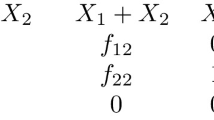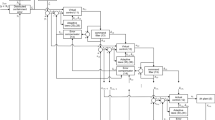Abstract
This paper investigates the finite-time and fixed-time bipartite consensus tracking (Fin- and Fix-TBCT) problems for second-order multi-agent systems (MASs) under a signed directed communication network, in which both cooperative and competition exist. To achieve bipartite consensus tracking (BCT) within finite time and fixed time, two novel distributed control protocols utilizing integral sliding-mode control concept are presented and discussed, respectively. By virtue of Lyapunov stability and homogeneity with dilation, several sufficient conditions for achieving Fin- and Fix-TBCT for second-order MASs are obtained. Eventually, numerical simulation results are provided to verify the validity of the obtained theoretical results.
Similar content being viewed by others
References
J. Qin, H. Gao, and C. Yu. “On discrete-time convergence for general linear multi-agent systems under dynamic topology”, IEEE Transactions on Automatic Control, vol. 59, no. 4, pp. 1054–1059, April 2014.
Y. Chang, H. Yan, W. Huang, R. Quan, and Y. Zhang. “A novel starting method with reactive power compensation for induction motors”, IET Power Electronics, vol. 16, no. 3, pp. 402–412, 2023.
Y. Tian, H. Yan, H. Zhang, X. Zhan, and Y. Peng. “Resilient static output feedback control of linear semi-Markov jump systems with incomplete semi-markov kernel”, IEEE Transactions on Automatic Control, vol. 66, no. 9 pp. 4294–4281, September 2021.
G. Wen, Z. Duan, G. Chen, and W. Yu. “Consensus tracking of multi-agent systems with Lipschitz-type node dynamics and switching topologies”, IEEE Transactions on Circuits and Systems I: Regular Papers, vol. 61, no. 2, pp. 499–511, February 2014.
X. Cao and Y. Li. “Positive consensus for multi-agent systems with average dwell time switching”, Journal of the Franklin Institute, vol. 358, no. 16, pp. 8308–8329, October 2021.
Y. Zheng, Y. Zhu, and L. Wang. “Consensus of heterogeneous multi-agent systems”, IET Control Theory and Applications, vol. 5, no. 16, pp. 1881–1888, November 2011.
L. Ding and W. X. Zheng. “Consensus tracking in heterogeneous nonlinear multi-agent networks with asynchronous sampled-data communication”, Systems and Control Letters, vol. 96, pp. 151–157, October 2016.
S. J. Yoo. “Distributed consensus tracking of a class of asynchronously switched nonlinear multi-agent systems”, Automatica, vol. 87, pp. 421–427, January 2018.
C. Altafini. “Consensus problems on networks with antagonistic interactions”, IEEE Transactions on Automatic Control, vol. 58, no. 4, pp. 935–946, April 2013.
J. Wu, Q. Deng, T. Han, and H.-C. Yan. “Distributed bipartite tracking consensus of nonlinear multi-agent systems with quantized communication”, Neurocomputing, vol. 395, pp. 78–85, June 2020.
J. Hu and H. Zhu. “Adaptive bipartite consensus on coopetition networks”, Physica D, vol. 307, pp. 14–21, July 2015.
S. Bhowmick and S. Panja. “Bipartite tracking of linear multi-agent systems under actuator saturation with relative output feedback”, IEEE Transactions on Circuits and Systems II: Express Briefs, vol. 68, no. 1, pp. 386–390, January 2021.
F. Sun, M. Tuo, J. Kurths, and W. Zhu. “Finite-time consensus of leader-following multi-agent systems with multiple time delays over time-varying topology”, International Journal of Control, Automation, and Systems, vol. 18, pp. 1985–1992, February 2020.
S. Li, H. Du, and X. Lin. “Finite-time consensus algorithm for multi-agent systems with double-integrator dynamics”, Automatica, vol. 47, no. 8, pp. 1706–1712, August 2011.
X. Liu, D. W. C. Ho, J. Cao, and W. Xu. “Discontinuous observers design for finite-time consensus of multiagent systems with external disturbances”, IEEE Transactions on Neural Networks and Learning Systems, vol. 28, no. 11, pp. 2826–2830, November 2017.
T. Feng, B. Wu, Y. Wang, and Y. Chen. “Input-output finitetime stability of switched singular continuous-time systems”, International Journal of Control, Automation, and Systems, vol. 19, pp. 1828–1835, March 2021.
B. Tian, Z. Zuo, X. Yan, and H. Wang. “A fixed-time output feedback control scheme for double integrator systems”, Automatica, vol. 80, pp. 17–24, June 2017.
V. Andrieu, L. Praly, and A. Astolfi. “Homogeneous approximation, recursive observer design, and output feedback”, SIAM Journal on Control and Optimization, vol. 47, no. 4, pp. 1814–1850, 2008.
X. Liu, J. Cao, and C. Xie. “Finite-time and fixed-time bipartite consensus of multi-agent systems under a unified discontinuous control protocol”, Journal of the Franklin Institute, vol. 356, no. 2, pp. 734–751, January 2019.
H. Zhang, J. Duan, Y. Wang, and Z. Gao. “Bipartite fixedtime output consensus of heterogeneous linear multiagent systems”, IEEE Transactions on Cybernetics, vol. 51, no. 2, pp. 548–557, February 2021.
T. Han, Z.-H. Guan, B. Xiao, and H. Yan. “Bipartite average tracking for multi-agent systems with disturbances: finite-time and fixed-time convergence”, IEEE Transactions on Circuits and Systems I: Regular Papers, vol. 68, no. 10, pp. 4393–4402, October 2021.
W. Yu, G. Chen, M. Cao, and J. Kurths. “Second-order consensus for multi-agent systems with directed topologies and nonlinear dynamics”, IEEE Transactions on Systems, Man, and Cybernetics, Part B (Cybernetics), vol. 40, no. 3, pp. 881–891, June 2010.
C.-D. Liang, M.-F. Ge, Z.-W. Liu, Y.-W. Wang, and H. R. Karimi. “Output multi-formation tracking of networked heterogeneous robotic systems via finite-time hierarchical control”, IEEE Transactions on Cybernetics, vol. 51, no. 6, pp. 2893–2904, June 2021.
S. P. Bhat and D. S. Bernstein. “Geometric homogeneity with applications to finite-time stability”, Mathematics of Control, Signals, and Systems, vol. 17, pp. 101–127, May 2005.
Y. Hong. “Finite-time stabilization and stabilizability of a class of controllable systems”, Systems and Control Letters, vol. 46, no. 4, pp. 231–236, July 2002.
S. P. Bhat and D. S. Bernstein. “Finite-time stability of continuous autonomous systems”, SIAM Journal on Control and Optimization, vol. 38, no. 3, pp. 751–766, 2000.
Author information
Authors and Affiliations
Corresponding author
Ethics declarations
The authors declare no potential conflict of interests.
Additional information
Publisher’s Note Springer Nature remains neutral with regard to jurisdictional claims in published maps and institutional affiliations.
Recommended by Associate Editor Jun Moon under the direction of Senior Editor PooGyeon Park. This work was supported in part by the National Natural Science Foundation of China under Grants 62071173, 62072164 and 61971181, and the Natural Science Foundation of Hubei Province under Grant 2022CFB479.
Xiao-Feng Zhao received her B.S. degree in Linyi University, Linyi, China in 2020. She is pursuing an M.S. degree from the School of Electrical Engineering and Automation, Hubei Normal University, Huangshi, China. Her research interests include cooperative control of multiagent systems and complex networks.
Tao Han received his Ph.D. degree from the School of Artificial Intelligence and Automation, Huazhong University of Science and Technology, Wuhan, China, in 2017, and he is currently a Professor in the School of Electrical Engineering and Automation, Hubei Normal University. His research interests include cooperative control of multi-agent systems and complex networks.
Bo Xiao received her M.S. degrees from the School of Information Science and Engineering from the Wuhan University of Science and Technology, Wuhan, China in 2011. She is a Lecturer in the School of Electrical Engineering and Automation, Hubei Normal University. Her research interests include networked control systems and multi-agent systems.
Xi-Sheng Zhan received his B.S. and M.S. degrees in control theory and control engineering from the Liaoning Shihua University, Fushun, China, in 2003 and in 2006, respectively. He received his Ph.D. degree in control theory and applications from the Department of Control Science and Engineering, Huazhong University of Science and Technology,Wuhan, China, in 2012. He is a Professor in the School of Electrical Engineering and Automation, Hubei Normal University. His research interests include networked control systems, robust control, and iterative learning control.
Huaicheng Yan received his B.S. degree in automatic control from Wuhan University of Technology, Wuhan, China, in 2001, and a Ph.D. degree in control theory and control engineering from the Department of Control Science and Engineering, Huazhong University of Science and Technology, Wuhan, China, in 2007. He is a Professor with the School of Information Science and Engineering, East China University of Science and Technology. His current research interests include networked systems and multi-agent systems.
Rights and permissions
About this article
Cite this article
Zhao, XF., Han, T., Xiao, B. et al. Finite-time and Fixed-time Bipartite Consensus Tracking for Second-order Multi-agent Systems via an Integral Sliding-mode Approach. Int. J. Control Autom. Syst. 21, 3922–3931 (2023). https://doi.org/10.1007/s12555-022-0174-9
Received:
Revised:
Accepted:
Published:
Issue Date:
DOI: https://doi.org/10.1007/s12555-022-0174-9




